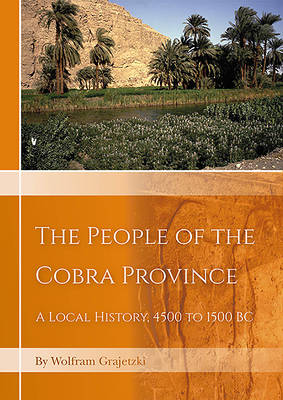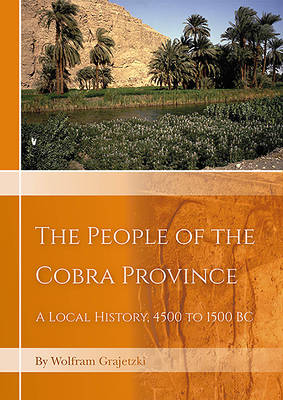
Door een staking bij bpost kan je online bestelling op dit moment iets langer onderweg zijn dan voorzien. Dringend iets nodig? Onze winkels ontvangen jou met open armen!
- Afhalen na 1 uur in een winkel met voorraad
- Gratis thuislevering in België vanaf € 30
- Ruim aanbod met 7 miljoen producten
Door een staking bij bpost kan je online bestelling op dit moment iets langer onderweg zijn dan voorzien. Dringend iets nodig? Onze winkels ontvangen jou met open armen!
- Afhalen na 1 uur in een winkel met voorraad
- Gratis thuislevering in België vanaf € 30
- Ruim aanbod met 7 miljoen producten
Zoeken
The People of the Cobra Province in Egypt
A Local History, 4500 to 1500 BC
Wolfram Grajetzki
Hardcover | Engels
€ 92,45
+ 184 punten
Omschrijving
The book delivers a history from below for the first half of Egyptian history covering the earliest settlements, state formation and the pyramid age. The focus is on the Wadjet province, about 350 km south of modern Cairo in Upper Egypt. Here archaeological records provide an especially rich dataset for the material culture of farmers. Histories of Ancient Egypt have focussed heavily on the kings, monuments and inscriptions, while the working population is hardly mentioned. The book investigates the life of people far from the centres of power. One main aim of the book is the interaction between farmers and the ruling classes at the centres of power and locally. How did decisions at the royal centre affect the life of ordinary people? The Introduction offers a critical survey of Egyptologists and their attitudes towards the working class. The social and cultural background of these researchers is analysed to assess how heavily they are influenced by time and their political and cultural background.
The First chapter then describes the location and gives a history of previous research and excavations. The archaeological sites and the recorded ancient place names of the province are presented to provide a geographical framework for the book. The following chapters are arranged in chronological order, mainly according to the archaeological phases visible in the province. It appears that in phases of a weak central government, people in the provinces were much better off, while in phases of a strong central government burials of poorer people are almost absent. The reasons for this are discussed.
A substantial part of the book comprises descriptions of single burials and the material culture in the province. The archaeology of the poorer people is the main focus. Burial customs and questions of production are discussed. For a fuller picture, evidence from other parts of Egypt is also taken into account. Thus settlement sites in other regions are presented to provide contemporary evidence for living conditions in particular periods.
As the book will focus on the lower classes, the Tributary Mode of Production will be used as the main theoretical framework. The Tributary Mode of Production (previously known as the Asiatic Mode of Production) is a term that goes back to Karl Marx, but was mainly used in the 20th century to describe ancient societies whose economies were not based on slaves. A constant question will be the status of the working population. Were they slaves, serfs or free citizens? It will be argued that they were most often in a dependent position comparable to that of serfs, while there is little evidence for slavery. The numerous burials presented in the volume are important for highlighting the diversity of burials in the different periods. Many will be placed in special subchapters. Readers can skip these chapters when they prefer to concentrate on the main text.
The First chapter then describes the location and gives a history of previous research and excavations. The archaeological sites and the recorded ancient place names of the province are presented to provide a geographical framework for the book. The following chapters are arranged in chronological order, mainly according to the archaeological phases visible in the province. It appears that in phases of a weak central government, people in the provinces were much better off, while in phases of a strong central government burials of poorer people are almost absent. The reasons for this are discussed.
A substantial part of the book comprises descriptions of single burials and the material culture in the province. The archaeology of the poorer people is the main focus. Burial customs and questions of production are discussed. For a fuller picture, evidence from other parts of Egypt is also taken into account. Thus settlement sites in other regions are presented to provide contemporary evidence for living conditions in particular periods.
As the book will focus on the lower classes, the Tributary Mode of Production will be used as the main theoretical framework. The Tributary Mode of Production (previously known as the Asiatic Mode of Production) is a term that goes back to Karl Marx, but was mainly used in the 20th century to describe ancient societies whose economies were not based on slaves. A constant question will be the status of the working population. Were they slaves, serfs or free citizens? It will be argued that they were most often in a dependent position comparable to that of serfs, while there is little evidence for slavery. The numerous burials presented in the volume are important for highlighting the diversity of burials in the different periods. Many will be placed in special subchapters. Readers can skip these chapters when they prefer to concentrate on the main text.
Specificaties
Betrokkenen
- Auteur(s):
- Uitgeverij:
Inhoud
- Aantal bladzijden:
- 288
- Taal:
- Engels
Eigenschappen
- Productcode (EAN):
- 9781789254211
- Verschijningsdatum:
- 6/04/2020
- Uitvoering:
- Hardcover
- Formaat:
- Genaaid
- Afmetingen:
- 173 mm x 241 mm
- Gewicht:
- 907 g

Alleen bij Standaard Boekhandel
+ 184 punten op je klantenkaart van Standaard Boekhandel
Beoordelingen
We publiceren alleen reviews die voldoen aan de voorwaarden voor reviews. Bekijk onze voorwaarden voor reviews.











